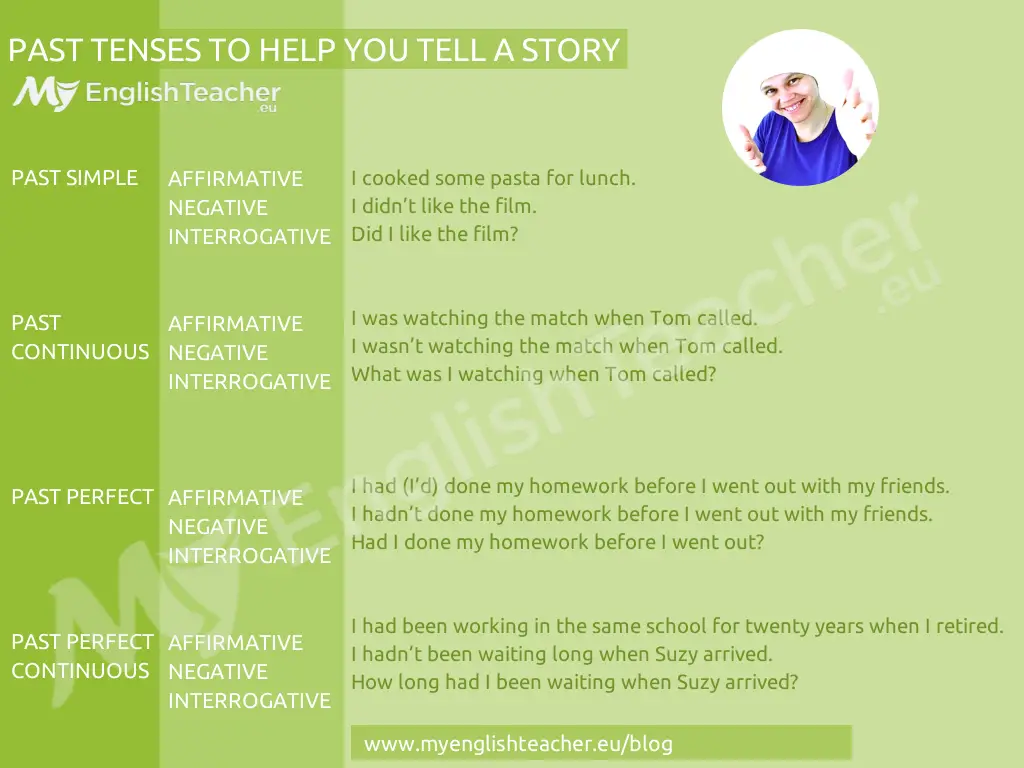
All About the Past: Simple, Continuous, Perfect, Perfect Continuous
“The past is a ghost, the future a dream, and all we ever have is now.”– Bill Cosby
- I had been thinking a lot about how to start this article then I decided to use a quote.
- I was looking for quotes on a website when I came across Bill Cosby’s wonderful thought.
- After I had read it a couple of times, I found that it would make a really nice opening line.
As you can see, there are several different past forms used in the above paragraph. To be exact, there are four: Past Simple, Past Continuous, Past Perfect and Past Perfect Continuous. In your own language, there may be much fewer structures that can be used to talk about the past. If you would like to learn when and how to use the different past forms in English, keep reading.
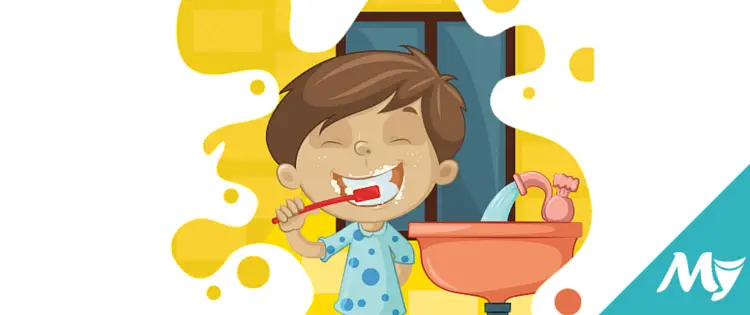
PAST SIMPLE
AFFIRMATIVE: subject + verb in past simple (2nd form of the verb)
- They moved to Paris in 2007.
- You moved to Paris in 2007.
- We moved to Paris in 2007.
- He/ She moved to Paris in 2007.
- You moved to Paris in 2007.
- I moved to Paris in 2007.
- I cooked some pasta for lunch.
- You cooked some pasta for lunch.
- He/ She cooked some pasta for lunch.
- We cooked some pasta for lunch.
- You cooked some pasta for lunch.
- They cooked some pasta for lunch.
- I went to the supermarket this morning.
- You went to the supermarket this morning.
- He/ She went to the supermarket this morning.
- We went to the supermarket this morning.
- You went to the supermarket this morning.
- They went to the supermarket this morning.
The second form of a verb is made by adding – D or – ED to regular verbs.
If the verb ends with an ’E’ (live, bake, smile),
- add – D (liveD, bakeD, smileD)
If the verb ends with consonants (t, r, l etc.),
- add – ED (liftED, optED, wheelED)
If a one-syllable verb ends with a single vowel and a single consonant (stop, step, sob),
- double the last consonant (stoPPed, stePPed, soBBed)
If the verb ends with a consonant and the letter Y (study, carry, supply),
- take off Y and add – IED (studiED, carriED, suppliED)
If the verb is irregular, choose the correct form from an irregular verb list (go-went, drive-drove, take-took etc.)
Recommended for you:
200 Most Common Irregular Verbs + Gerunds
What is the difference between a regular verb and an irregular verb?
NEGATIVE: subject + didn’t (didn’t = did not) + verb
- I didn’t like the film.
- You didn’t like the film.
- He/She didn’t like the film.
- We didn’t like the film.
- You didn’t like the film.
- They didn’t like the film.
- I didn’t drive to work.
- You didn’t drive to work.
- He/ She didn’t drive to work.
- We didn’t drive to work.
- You didn’t drive to work.
- They didn’t drive to work.
INTERROGATIVE: (question word) + did + subject + verb
- Did I like the film?
- Did you like the film?
- Did he like the film?
- Did we like the film?
- Did you like the film?
- Did they like the film?
*The verb ’to be’ is irregular too. This is how to use it:
- I/ He/ She/ It was late for the interview.
I/ He/ She/ It wasn’t (was not) late for the interview. - We/ You/ They were late for the interview.
We/ You/ They weren’t (were not) late for the interview. - Was he late for the interview?
Were you late for the interview?
WHEN TO USE?
Use this form to refer to a single action/state in the past. The time when it happened is either given in the sentence, or understood from the context:
- I got up early yesterday. (when? yesterday)
- Picasso was an outstanding artist. (when? understood: He isn’t alive anymore.)
You can also use it talk about past events in the order they happened:
- I got up, went to the bathroom and had a shower. (First, I got up, then I went to the bathroom, then I had a shower.)
Recommended for you:
Action Verb vs Linking Verb vs Helping Verbs vs Irregular Verb vs Modified Verb
Difference Between LOOSE LOSE LOSS and LOST

PAST CONTINUOUS
AFFIRMATIVE: subject + was/were + verb-ing
- I was watching the match when Tom called.
- You were watching the match when Tom called.
- He/She was watching the match when Tom called.
- We were watching the match when Tom called.
- You were watching the match when Tom called.
- They were watching the match when Tom called.
NEGATIVE: subject + wasn’t (was not)/weren’t (were not) + verb-ing
- I wasn’t watching the match when Tom called.
- You weren’t watching the match when Tom called.
- He/She wasn’t watching the match when Tom called.
- We weren’t watching the match when Tom called.
- You weren’t watching the match when Tom called.
- They weren’t watching the match when Tom called.
INTERROGATIVE: (question word) + was/were + subject + verb-ing
- What was I watching when Tom called?
- What were you watching when Tom called?
- What was he/she watching when Tom called?
- What were we watching when Tom called?
- What were you watching when Tom called?
- What were they watching when Tom called?
WHEN TO USE?
Use Past Continuous to express that an action was IN PROGRESS at a specific time in the past:
- At 7.40 this morning (specific time), I was having a shower (this action was in progress).
- I was living in Paris (action in progress) when I met my husband (specific time).
’In progress’ means that the action was started before and finished after that point in time. For example:
- I started having a shower at 7.30 and finished it at 7.45. (That means that at 7.35 I was having a shower.) At 7.40 I was still having a shower.
Or:
- I started living in Paris in 2005 and finished it in 2009.
- ’I was living in Paris when I met my husband’ means that some time between the two dates, I met my husband. Maybe it happened in 2006, maybe it happened in 2007 or 2008. But at that specific time when I met him, ’living in Paris’ was in progress.
More examples:
- She was waiting for the bus when it started to rain.
- We were playing football when my friend broke his leg.
- What were you doing this time yesterday?
- They were having lunch when I arrived.
You can also use Past Continuous to give a time frame to an action in the past:
- I was having a shower from 7.30 to 7.45.
- I was living in Paris from 2005 to 2009.
- I was working hard all day yesterday.(time frame: from the morning until the evening)
- We were partying all night.
Past Continuous can also be used to talk about two actions that were in progress at the same time:
- I was listening to music while I was doing my homework.
- While my husband was washing the windows, I was making lunch.
- What were you doing while I was trying to call you?
Recommended for you:
How to make Past Participle, Present Perfect Sentences etc.?
What’s the difference between Present Participle and Gerund?

PAST PERFECT
AFFIRMATIVE: subject + had + past participle of the verb (3rd form)
- I had (I’d) done my homework before I went out with my friends.
- You had (You’d) done your homework before you went out with your friends.
- He/She had (He’d) done his/her homework before he/she went out with his/her friends.
- We had (We’d) done our homework before we went out with our friends.
- You had (You’d) done your homework before you went out with your friends.
- They had (They’d) done their homework before they went out with their friends.
NEGATIVE: subject + hadn’t (had not) + past participle of the verb (3rd form)
- I hadn’t done my homework before I went out with my friends.
- You hadn’t done your homework before you went out with your friends.
- He/She hadn’t done his/her homework before he/she went out with his/her friends.
- We hadn’t done our homework before we went out with our friends.
- You hadn’t done your homework before you went out with your friends.
- They hadn’t done their homework before they went out with their friends.
INTERROGATIVE: (questions word) + had + subject + past participle of the verb (3rd form)
- Had I done my homework before I went out?
- Had you done your homework before you went out?
- Had he/she done his/her homework before he/she went out?
- Had we done our homework before we went out?
- Had you done your homework before you went out?
- Had they done their homework before they went out?
WHEN TO USE?
Use Past Perfect to express that an action happened BEFORE a specific time/another action in the past.
’I had done my homework before I went out.’ In this example, ’doing homework’ happened first and ’going out’ happened later.
You can also say ’I had done my homework before/by 5pm.’ We use Past Perfect to make it clear which of the actions happened first.
More examples:
- Had you locked the door before you left?
- Where had you lived before you moved here?
- I’d lived in the capital before I moved here.
- I’d already finished cooking by the time the guests arrived.
- The film had just started when I switched on the TV.
- Luckily, I’d saved my work before the computer crashed.
- I had never seen that man before the party.
Recommended for you:
Pronunciation of –ed
MODAL VERB + HAVE + PAST PARTICIPLE!
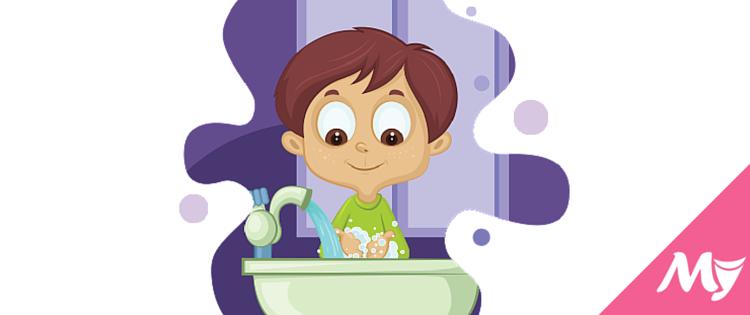
PAST PERFECT CONTINUOUS
AFFIRMATIVE: subject + had been + verb-ing
- I had been working in the same school for twenty years when I retired.
- You had been working in the same school for twenty years when you retired.
- He/She had been working in the same school for twenty years when he/she retired.
- We had been working in the same school for twenty years when we retired.
- You had been working in the same school for twenty years when you retired.
- They had been working in the same school for twenty years when they retired.
NEGATIVE: subject + hadn’t (had not) been + verb-ing
- I hadn’t been waiting long when Suzy arrived.
- You hadn’t been waiting long when Suzy arrived.
- He/She hadn’t been waiting long when Suzy arrived.
- We hadn’t been waiting long when Suzy arrived.
- You hadn’t been waiting long when Suzy arrived.
- They hadn’t been waiting long when Suzy arrived.
INTERROGATIVE: (question word) + had +subject +been + verb-ing
- How long had I been waiting when Suzy arrived?
- How long had you been waiting when Suzy arrived?
- How long had he/she been waiting when Suzy arrived?
- How long had we been waiting when Suzy arrived?
- How long had you been waiting when Suzy arrived?
- How long had they been waiting when Suzy arrived?
WHEN TO USE?
Use Past Perfect Continuous to express that an action was IN PROGRESS for some time before/until another action or time in the past.
’I’d been working in the same school for twenty years when I retired.’ means that ’working’ was in progress for twenty years BEFORE my retirement. I started working there in 1985 and retired in 2005.
More examples:
- I’d been looking for my keys for hours when I found it.
- It had been snowing for days before Christmas.
- I had been living with my parents until I got my first job.
- She’d been learning French for two years when she decided to take the exam.
SUMMARY
- Tom had been going out with Mary for a year when he decided to propose to her. That night he took Mary to the best restaurant in town.
- He wanted to give her the ring at the end of the meal. They had finished eating and were speaking about their plans for the future when suddenly Tom went down on his knees and popped the question.
- Mary said yes and everybody cheered. When the waiter brought them the bill, Tom realized that he had left his wallet at home, so he asked Mary to pay for the dinner.
Do you understand why certain past forms are used in the above sentences? If not, feel free to ask questions in the comment area below.
For more practice, watch this funny video and read about what happened to Mr Bean. Afterwards, see if you can tell the story without looking at the sentences.
- Mr Bean was sitting at the table when he noticed an envelope.
- He opened the envelope, read the card and put it on the table.
- It was the card he had written to himself a few minutes earlier.
- The waiter brought him the menu.
- Mr Bean chose from the menu after he had counted his money.
- He gave the waiter a coat hanger. He had been sitting with this hanger in his jacket for a long time when he noticed it.
- He was playing with a knife when a lady looked at him.
- He tucked the tablecloth into his collar, because he had thrown away his napkin.
- He had been chewing his food for a minute before he could swallow it.
- Then he put some of the meat into a bread roll.
- He was hiding some meat under the plate as the waiter passed his table.
- A musician started playing the violin. He was playing music while Mr Bean was holding a fork in his hand.
- When he turned around, Mr Bean spat the food into the musician’s trousers then hid some more meat in the lady’s handbag.
- The musician was still playing when one of the waiters tripped over Mr Bean’s outstretched leg.
- The waiter was clearing up the mess when the headwaiter came to Mr Bean’s table.




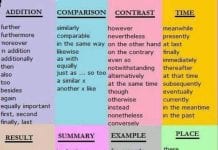

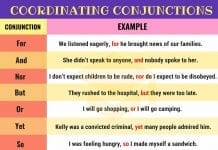
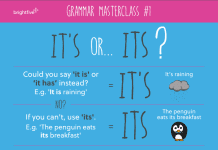
















I’d like to learn more things